Chapter 10 - William Ponting & Emily Maria Snell
William Ponting was born around 1844. I have been unable to trace the
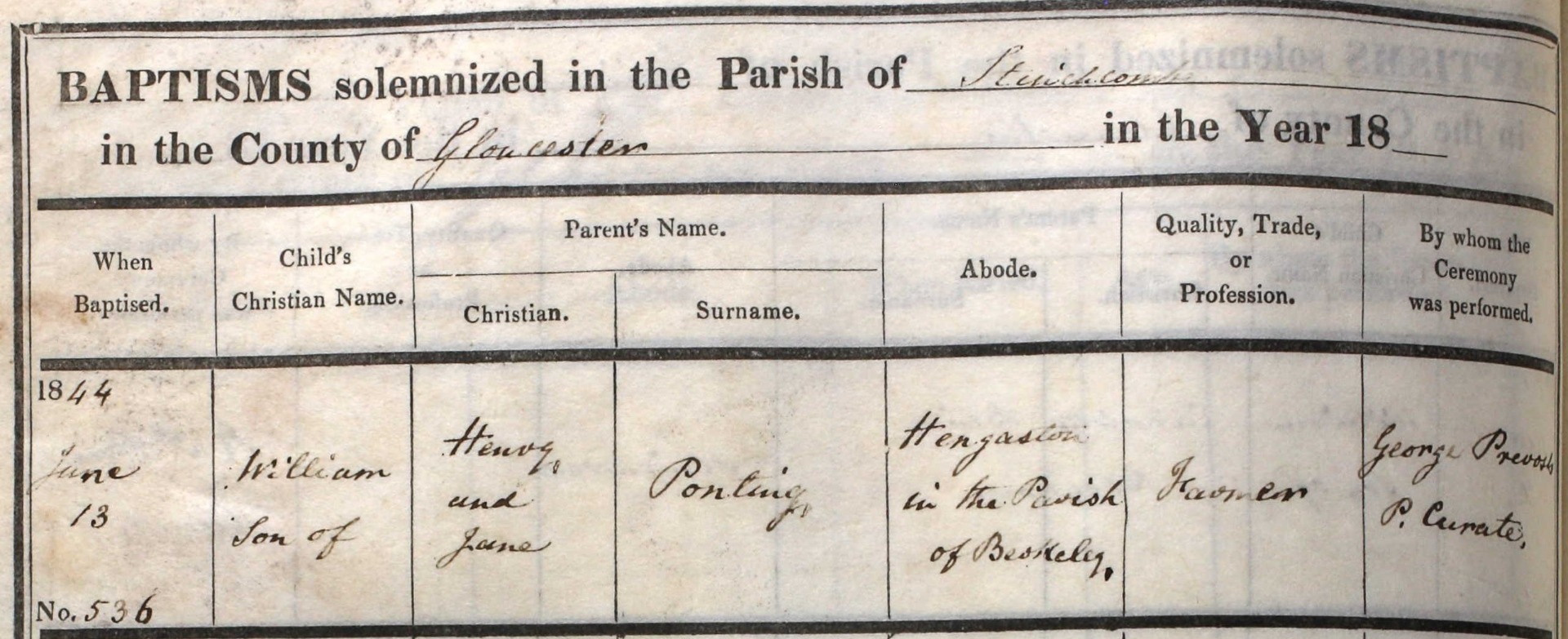
The 1851 census shows William, aged 7, a scholar, born Berkeley living with his widowed mother, Jane and siblings at Appleridge, Highfield, Gloucestershire (Chapter 4).
By 1861 he was no longer living at home in Appleridge. Two out of three of his brothers were working for drapers in London. No trace has been found of William who would have been around 17 at the time. The only possible entry which could be him is a William Ponting, aged 15, drapers assistant living with 7 other drapers assistants at Croydon Road, St Marylebone. Not only is the age wrong, but the census shows he was born in Bloomsbury. It's not at all clear who would have provided the information as there was no one shown as 'head of household'.
There is also no trace of William in the 1871 census, but from at least 1875 he was in partnership with is brothers John Jones Ponting and Sydney Ponting trading from 125 and 127 Kensington High Street (Chapter 5).
William was a witness as his brother Thomas' marriage in 1875 (Chapter 6) and he may have been one of the witnesses as sister Ashfield's marriage in 1876 (Chapter 12).
William Ponting and Emily Maria Snell were married on 4 April 1878 at St Mary's Church, Lambeth. William is described as a bachelor, aged 34, a linen draper living at High Street, Kensington. His father is shown as Henry Ponting, deceased, farmer. Emily was a 28-year-old spinster living at Lower Marsh. No occupation is given. Her father is shown as James Snell, draper. Both parties signed the marriage register. The witnesses were James Snell, Mary Ann Snell, Lucy Snell and M J Ponting (William's sister - Chapter 7). The certificate below is copied from the parish record and will show the actual signatures of the people concerned.

Emily Maria Snell was born on 5 February 1849 at 130 Lower Marsh, Lambeth, the daughter of James Snell, linen draper and Mary Ann Wanstall. Her family is detailed at Appendix M.
The marriage is recorded in the family bible still held by the family.

William and Emily had only the one son, Dudley James Ponting, was born on 15 June 1879. At the time William is described as a draper and his address given as 127 High Street, Kensington.

At the time that the 1881 census was taken William and Emily were living at 125-127 High Street, Kensington and the register includes:
- William Ponting, aged 36, head, draper, born Gloucester
- Emily M Ponting, wife, aged 32, born Lambeth, Surrey
- Dudley J Ponting, son, aged 21 months, born Kensington
- Patty P L Ponting, niece, (John's daughter - Chapter 9), aged 7, scholar, born Middlesex
- Emily Knight, aged 22, assistant
- Ethel Merryworth, aged 20, Catherine Maybroth, aged 18, Bessie Moon, aged 21, Amy Gilby, aged 15, Emily Woods, aged 17 and Florence Meredith, aged 23, all drapers assistants
- Florence Usher, aged 15, Clara Bradbrook, aged 14, Emma Cotton, aged 18, and Annie Looth, aged 18, all apprentices
It is believed that one of the employees of the business, listed as Ethel Merryworth, was Elizabeth Merryweather who went on to marry William's elder brother John in 1885 (Chapter 9).

In 1883 and 1884 William Ponting of 127, Kensington High Street (along with brothers John Ponting of 91, Talbot Road and Sydney Ponting of 1 Cheniston Gardens) were eligible to vote in the Phillimore District of Kensington (and later the Queens Gate District) by virtue of their interest in 125, Kensington High Street.
In 1884 the partnership between William, John Jones and Sydney Ponting was dissolved, but William continued in partnership with his brother John Jones Ponting (see Chapter 5).
In 1887 William, John and Sydney are still listed in the Electoral Register, now the Town District. They all now give their address as 125 Kensington High Street and it is by virtue of that property that they are eligible to vote.
In 1890 William Ponting of 127, High Street, Kensington (with just his brother John Jones Ponting of 91 Talbot Road) are included on the "Register of Parliamentary Voters and County Elections" for Queens Gate District in the Borough of Kensington by virtue of their joint interest in 125 Kensington High Street.
So, in 1891 46-year-old William and 41-year-old Emily were still living in High Street, Kensington, but the business now occupied 123 to 127 and 127a High Street and there were over 50 live-in employees including, at 123 to 127 High Street,
- Kathleen L Constable, aged 49, Elizabeth J Hodge, aged 37, Susan Chater, aged 36, Mary C Douglas, aged 35, Emily A Roberts, aged 35, Harriet A Collins, aged 26, Florence E Wilson, aged 26, Sarah J Lawrence, aged 26, Frederick G Charlton, aged 25, Isabella Boshier, aged 25, Charles W Hall, aged 25, Gertrude E Smith, aged 24, Florence L Harper, aged 24, Constance M Saunders, aged 21, Susan Blain, aged 21, Gertrude C Carling, aged 20, Eleanor A Ritchie, aged 20, Alice M Eade, aged 20 (owned 30 shares in 1898), Sophia Badger, aged 20, Martha J Whitewell, aged 19, Ada M Cliff, 19, Catherine B Smith, aged 18, Florence M Wright, aged 18, Millinda Cox, aged 15, Florence McLachlin, aged 15, Helen G Freith, aged 14, Amy E Farlinger, aged 14, Adelaide Goss, aged 14, Lydia McCormack, aged 14, Francis Gore, aged 11, all drapers assistants
- Ella Jones, aged 22, Augusta L Matthews, aged 18, Edith Knight, aged 17, Helen H Baker, aged 17, Beatrice Jones, aged 14, Louisa V Taylor, aged 13, all apprentices
- Annie K Roberts , aged 36, housekeeper, Martha M A Mankins, aged 27, domestic cook, Edith S Barff, aged 45, dining room maid, Houla J Jeffrey, aged 21, parlour maid, Emily Harmes, aged 29, housemaid, Amy Church, aged 21 house maid, Matilda Lowe, aged 25, kitchen maid.
And at 127a High Street,
- Samuel H Fiske, aged 30, John Rodham, aged 24 and Ernest Riley, aged 22, all drapers assistants,
- Robert Leach, aged 40, Robert McClean, aged 28 and Fred Merchant, aged 20, all drapers clerks,
- Daniel Rudland, aged 64 and Maria Rudland, aged 60, caretakers
This certainly illustrates how, as described in Chapter 5, the business had expanded.
In 1891 their son Dudley James Ponting, aged 11 was a pupil at Lancaster Place, Margate.
By 1895 a William Ponting is listed on the electoral register at Hillside, Queenswalk, Ealing. The qualifying address entitling him to vote was Hillside, Queenswalk. In 1896 he is still listed at Hillside, Castle Bar, Ealing but the qualifying property is now 125 Kensington High Street, This would seem to be "our" William. Was this when he first moved from the business premises?
Perhaps illustrating his prominence, "The Drapers' Record" dated 5 June 1897 (Edition No 514) includes a letter to the editor, where William Ponting of Kensington writes: "It occurs to me that it would be greatly to the interests of West End tradesmen if they were to combine to delay their summer s
The author of the article comments that this is still a discussion going on 116 years later. For the full article
In 1897 William Ponting of Winscombe Court, Ealing (along with brother John James (sic) Ponting of Appleridge were entitled to vote in the Parliamentary, County and Parochial elections for Queens Gate Polling District by virtue of their interest in 125 Kensington High Street! This is the earliest record mentioning Winscombe Court, Had William only just moved there?
In 1898 William Ponting of Winscombe Court, Mount Avenue Ealing (along with brother John James (sic) Ponting of Appleridge, St John Road, Putney were entitled to vote in the Parliamentary, County and Parochial elections for Holland Polling District by virtue of their interest in 16, Phillimore Place, Lower. It is not clear what was the connection to Phillimore Place. Was this something acquired after the disposal of the business? (see below)


16, Phillimore Place (pictured above) now has a blue plaque commemorating Kenneth Grahame (1859 - 1932), author of "The Wind in the Willows" who lived there between 1901 & 1908.
The photograph below is one of three enlarged portraits held in the family, which are believed to be William Ponting and his wife Emily. I have had these professionally dated. Professional photographs at that time were generally small "carte de visite" (54mm x 89mm) or "cabinet print" (110mm x 170mm), but by the late 1800's the "collodion transfer" method of enlarging was being used in photograph studios. The portraits we hold are almost "life-size".
William is formally dressed, the white bow tie generally reserved for special occasions. His hair is cut very short at the sides, longer on the top with a pronounced centre parting favoured from the late 1880's and from the early to mid 1890's a moustache would suffice where previously a man of his age would have sported a beard.
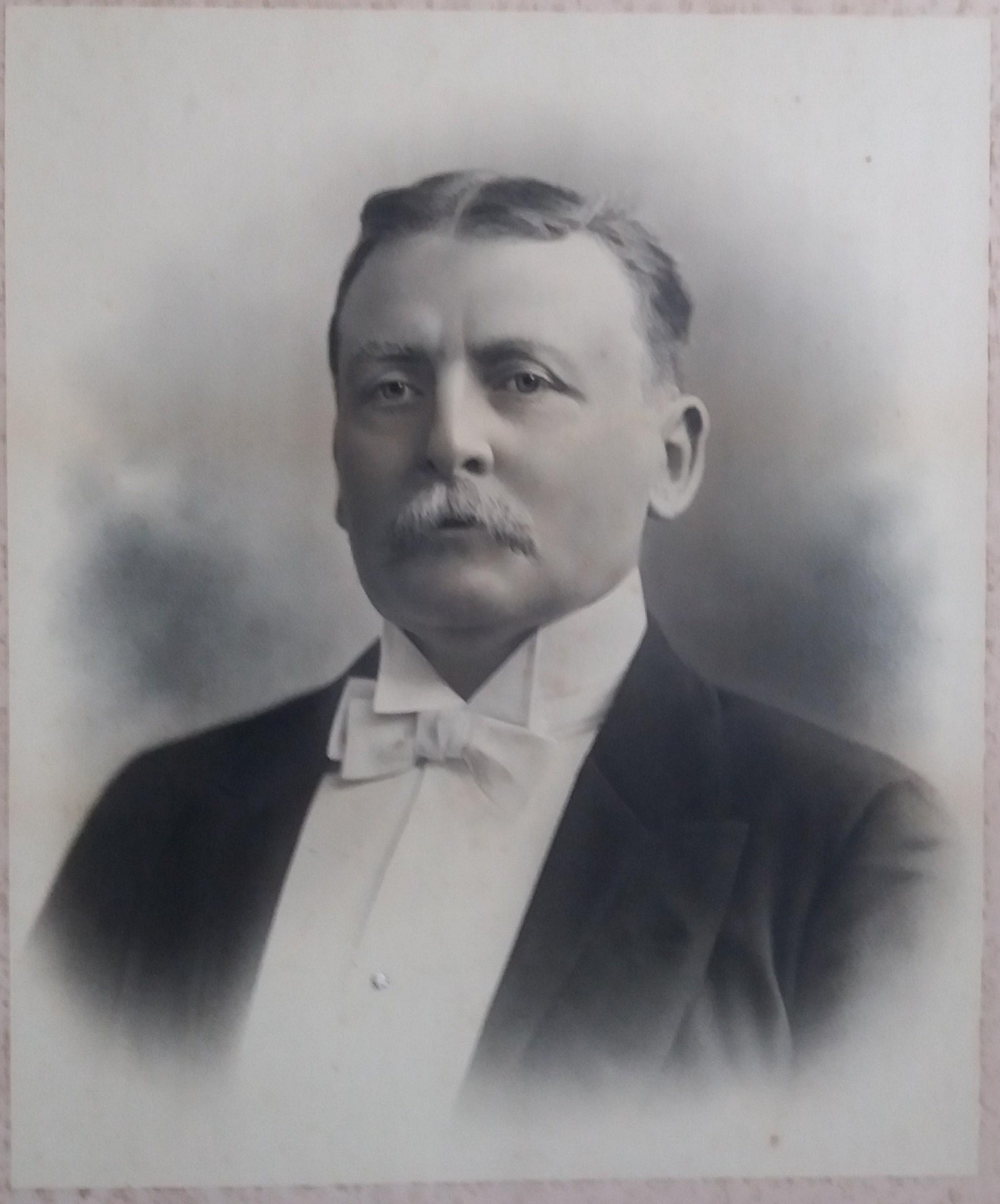
The other two portraits, which again are almost "lifesize", although differently dressed and posed appear to be of the same person and to date to the same period as the portrait of William, so I take these to be portraits of Emily Maria Ponting. In the first she is wearing what appears to be formal day wear with an elaborate bodice and an ornate lace collar. In the second the deep V-neckline suggests more formal dress or evening wear.
It could be that these portraits were taken in 1898, possibly to commemorate William and Emily's 20th wedding anniversary in the April or the sale of the business in the May (see below), or both. It was of course also the year that William died (below), was it that this was forseen?


In May 1898 William and his brother John Jones Ponting sold their business 'Ponting Brothers' to Ponting Brothers Ltd. Ignoring the value of any shares or debentures they received and assuming that the proceeds were split equally, William would have received around £19K in cash (the equivalent of around £1.4M in 2006).
William's niece, Gladys Merryweather Ponting (daughter of John Jones Ponting) wrote a journal describing her upbringing and family (Chapter 9). Known as "Sissie", in "Aunt Sissie's Journal" it is suggested that it was "because of William's health that they decided to retire and turn the business into a company". The journal also describes how "Mr William" "had red hair" and "got blood out of a stone". "Aunt Emily was "rather a poor thing" who died not long after William" (see below). Their son Dudley is described as "utterly spoilt and a thorough bounder,,,,,,,,,,,,,,,,He did outrageous things and then put the blame on anyone but him". Whoops, that's my Great-grandfather that Aunt Sissie is talking about!!
After the sale William retained an interest in the company and was appointed chairman for three years at a salary of £250 per annum with a dividend of 7% per year. The next record of shareholders in November 1898 indicates either he or his executors had sold some of the shares allotted to him presumably generating further funds and at that time he owned 14,041 of the 59,151 issued share capital. His address is given as Winscombe Court, Mount Avenue, Ealing (Chapter 5).
However, this information was not up to date for William had died on 26 October 1898. He was just 54 years old and the death certificate describes him as a retail draper. He died at Winscombe Court, Mount Avenue, Ealing. The informant at the time was his son D James Ponting (aged 19) who was present at the death. The cause of death is given as diabetes - 8 years, cirrhosis of the liver and dropsy.
'The Kensington News' on Saturday 29 October 1898 carried the following obituary
"By the death of Mr William Ponting, Kensington has lost one of its most prominent tradesmen, a men who by sheer hard work had bought himself to the front rank. Mr Ponting had long suffered from diabetes, which followed by dropsy, terminated in death at his Ealing residence last Wednesday morning. The funeral will take place to-day (Saturday), the first portion of the ceremony at St Matthew's Church, Ealing- common and the interment at Ealing Cemetery, which is situated at South Ealing, near to the older portion of the town, and often referred to as 'Little Ealing'.
At an extraordinary board meeting held on the 26 inst, the directors of Ponting Brothers Ltd passed the following resolution - "That they desire to place on record their sincere and heartfelt sympathy with the widow and family of their late chairman and they accept with melancholy satisfaction to be present at the funeral on Saturday next"'
The following week 'The Kensington News' (dated 5 November 1898) reports the funeral
'The funeral of Mr William Ponting took place last Saturday. The first part of the service took place at 3.15 in St Matthews Church, Ealing, Rev. H C Douglas, vicar, officiating, and the internment at South Ealing Cemetery
Present: Messrs Dudley James Ponting (son), Thomas H Ponting, John J Ponting (brothers), Henry Ponting (nephew), Arthur Ponting (cousin), Wm J B Tippet (solicitor) (trustee), Thomas Lilley, Beardsworth, Thos. Brown, W Cullimore, E Parr, W B Skinner, C Cole Jones, Wm. Owen, Arthur Sykes, J R Parsley (friends), Lord Walter Gordon-Lennox, Mr A W Poulton (directors), Messrs W A Forbes (manager), S Mussell (secretary), Misses Mills, Dennis, Jones, Tomlinson, Messrs Watkin-Jones, Picton and Gorner (superintendents and buyers). City houses: Mr Brett (Vyse, Sons & Co), Mr Warren Edwards (Boyd & Co). A number of assistants from High Street were also present
Floral tributes were received from the following - Buyers and superintendents (harp with broken string), assistants (a very large "broken column"), directors (wreath), manager and secretary (cushion), maids at High Street (wreath), Miss A K Roberts (anchor), Mr F Hunter (wreath), Mr Poulden, maids at Winscombe Court, Mrs and D J Ponting, Mr and Mrs T H Ponting, Mr and Mrs J J Ponting, Mrs Finemore and Mrs Love, Misses Mary and Edie Ponting, Mr and Mrs A Ponting, Mr and Mrs Cole Jones, Mrs Jones and family, Mr Tippets, Mr and Mrs Skinner , Mr and Mrs Lilley, Mr and Mrs Parr, Mr Lilley, sen., and Miss Lilley, Mr Brown, Mr and Mrs Harrington, Miss Gaubert, Mr and Mrs Chick, Mr and Mrs Davies and family, Mr A J Brett, Mr Hallett, Mr Knight, Mr and Mrs Skinner, jun., Mr and Mrs Sykes, Mr and Mrs Lilley, Jun, and Mr G Beard. The funeral arrangements were admirably carried out by Mr C G Hatt of Kensington High Street"
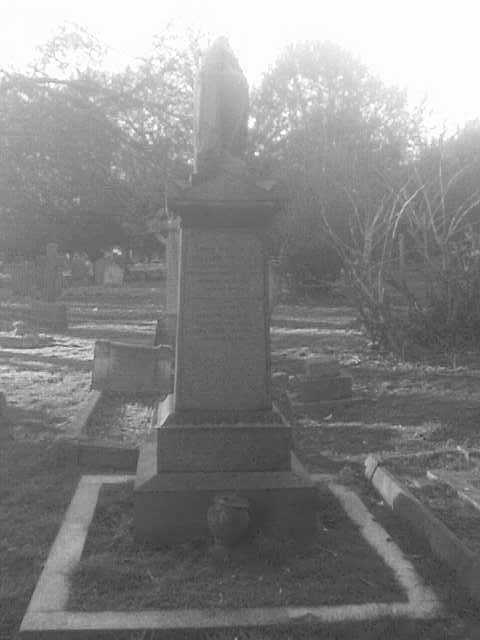
The inscription on the memorial reads "In ever loving memory of William Ponting of Kensington and Ealing who passed peacefully away on October 26 1898 aged 54 years. Also of Emily Maria, widow of the above, died March 13 1902 aged 53 years".
In William's will (which he made on 29 July 1898) he appoints William James Berriman Tippetts, solicitor, and Arthur Ponting, gentleman, as his executors. His estate is valued at £26,757 4s 2d (worth approx. £2M in 2006)
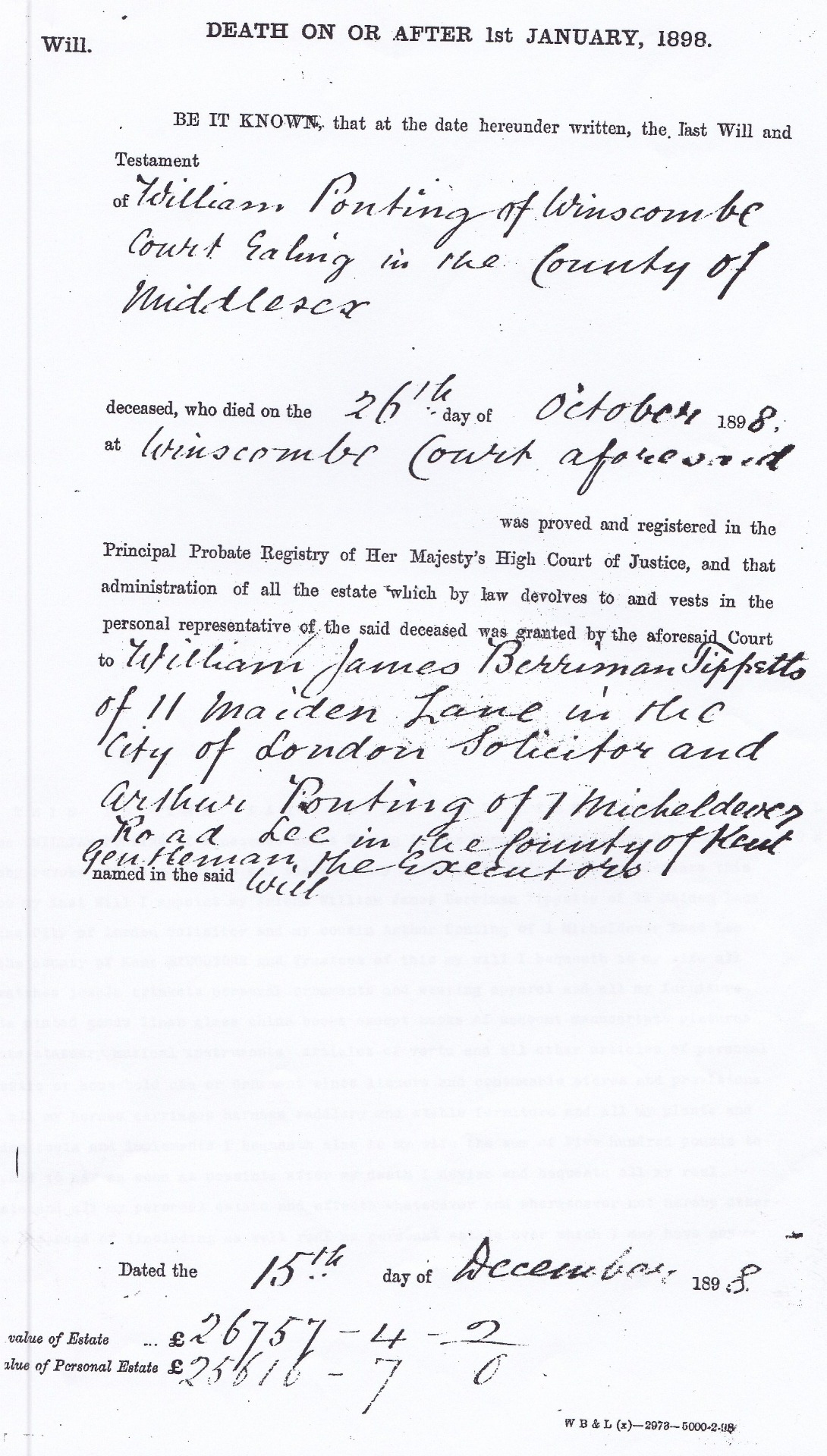
The will itself is a somewhat complicated affair, the specific provisions state that William leaves:
- All his watches, jewels, trinkets, personal ornaments, wearing apparel, furniture, plate, linen, glass, china, books (except books of account), wines, liquors, horses, carriages, saddlery, plants, garden tools and implements to his wife Emily
- The sum of £500 to Emily
His remaining assets are then left in trust. The trustees are William James Berriman Tippetts and Arthur Ponting. The residue of the estate is then divided into four equal parts. These parts are to be invested by the trustees. The type of investments to be made are detailed in the will, but include 'in particular in or upon the debenture, preference or ordinary shares of Ponting Brothers Ltd or of any company which may take over the business carried on by them'. The trust retained an interest in Ponting Brothers Ltd until it was dissolved in 1906/7, but does not appear to have increased that interest.
The income from three out of four of the parts is to be paid to Emily during her widowhood, but if Emily were to remarry she would be paid £250 per annum for life and the remaining income from these parts would be paid to his son Dudley. It then goes onto say that following the later of either his wife's or his son's death the income (and capital) is to be distributed between Dudley's children as set out in Dudley's will. In the absence of there being such a will the estate is to be divided equally. If Dudley dies without having children the estate is to be distributed to Williams nephew and nieces as set out in his Dudley's will. If this is not specified in Dudley's will then it is to be divided between William's remaining nieces and nephews in equal shares. There is however a clause allowing Dudley to make provision for an income for his surviving spouse in precedence to his children or William's nephews and nieces.
The income from the fourth part is to be paid to Dudley. On reaching 25 he becomes absolutely entitled to this fourth share of the capital, unless he has been made bankrupt or taken any other action which means this share belongs to another person (This clause also effects his entitlement to income from the first three parts of the estate) in which case the income is distributed to Emily, Dudley, Dudley's wife (if any), his children or remoter issue as the trustees see fit. Before Dudley reaches 25 the trustees may from this part lend him up to £3,000 to enable him to set up or invest in any business if they 'deem it advisable'.
In 1899, despite his death, William Ponting remains on the electoral register for Ealing, by virtue of the property at Winscombe Court.
Five months after William died, on 4 March 1899 the Hampshire Telegraph lists the visitors staying at Southsea and includes Mrs Ponting, Mr Dudley James Ponting, Mr and Mrs T H Ponting and Misses Ponting (Chapter 6) who are staying at the Royal Pier Hotel.

Emily did not remarry and in 1901 she was living with Dudley at 8 Blakesley Avenue, Ealing. The entry in the census return reads:
- Emily U Ponting, head, widowed, aged 52, living on her own means, born Lambeth, Surrey
- Dudley J Ponting, son, unmarried, aged 21, living on his own means, born Kensington, London
- Mabel K Clements, visitor, unmarried, aged 21, born Kingston Upon Thames, Surrey
- Emma Snell, servant, unmarried, aged 55, a Lady companion, born Pimlico, London (Appendix M)
- Elizabeth Hayden, servant, unmarried, aged 23, cook, born St Kevorn, Cornwall
- Gertrude A Newell, servant, unmarried, aged 20, housemaid, born Farnham, Bucks
In 1901 Ealing electoral register for County and Parochial elections she is listed at 8 Blakesley Avenue and she has the right to vote because of "dwelling houses (successive)" by virtue of "8 Blakesley Avenue from 41 Mount Avenue". She would not have got the right to vote in parliamentary elections until The Representation of Peoples Bill in 1918 gave woman over 30 and all men over 21 the right to vote.

Emily Maria Ponting died on 13 March 1902 at 8 Blakesley Avenue, Ealing aged 53. Emily is described as the widow of William Ponting, a draper. The cause of death is given as acute bronchitis and cardiac failure. The informant was Dudley James Ponting who gave his address as 39 Kensington Hall Gardens.
8, Blakesley Avenue is pictured below:
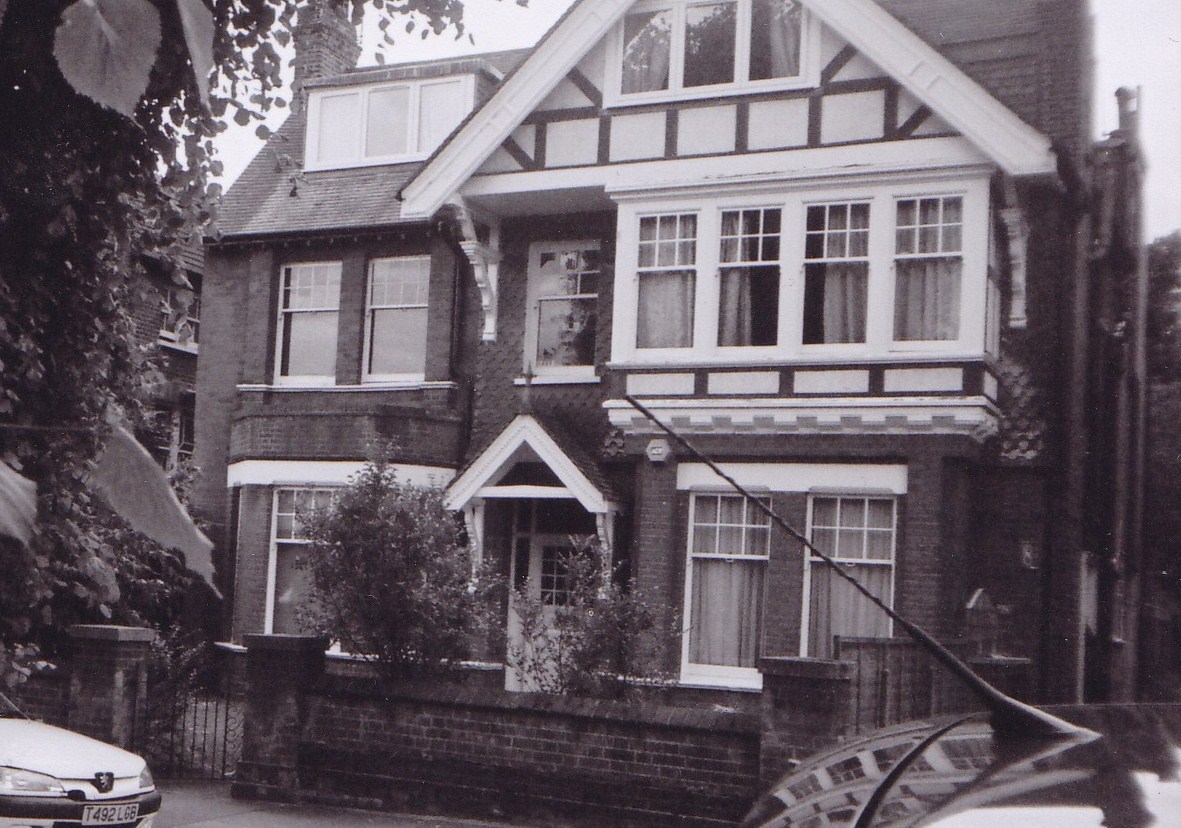
Emily was buried with her husband at South Ealing Cemetary on 3 April 1902.

In her will made on 12 June 1901 Emily appoints Arthur Ponting and her son Dudley James Ponting, both described as gentlemen, as her executors. She had inherited little of her husbands assets when he had died some three and a half years previously. Her will is of more interest for its specific bequests. Having said that her estate was still valued at £1,596 15s 4d (worth £119K in 2006) .
The specific bequests include:
- £50.00 for Arthur Ponting
- Her wedding ring, her Mizpah ring and diamond cluster to her son, Dudley (Mizpah jewellery first came about in the 1850s and 1860s an was popular through the 1880s. It was often given as a mark of affection between two people in a time when there were strict rules for courtship and what could be safely exchanged as gifts).
- Her 'fitted dressing bag' to Mabel Clements (the will was signed after Mabel's first marriage to Dudley and three days before her second - Chapter 13).
- Her watch and chain to her niece, Mildred Love (Chapter 8)
- All her wearing apparel and the rest of her jewellery and personal ornaments to be divided between her sisters Mary Ann Snell and Lucy Snell
- £50.00 to her Cousin Emma Snell as 'a token of gratitude for her great kindness during the last illness and after the death of my dear husband' (Appendix M)
- £600.00 'which is about the sum received by me at the death of my dear mother' to be divided equally 'between such of my sisters as shall be living at the time of my death'
Emily's estate included 300 shares in Ponting Brothers Ltd which her executors disposed of on 3 November 1902.
Our line continues through William and Emily's son, Dudley James Ponting (Chapter 13), but first we consider the last of Henry and Jane's children.
Click here to go to "Chapter 11 - Sydney Ponting"
To find out more about the Pontings store, click here to go to "Chapter 5 - Ponting Brothers Ltd"
To find out more about the Snells, click here to go to "Appendix M - The Snells of Warborough and London"
To find out more about William and Emily's son click here to go to "Chapter 13 - Dudley James Ponting".
Click here to go back to "Chapter 4 - Henry Ponting and Jane Jones"